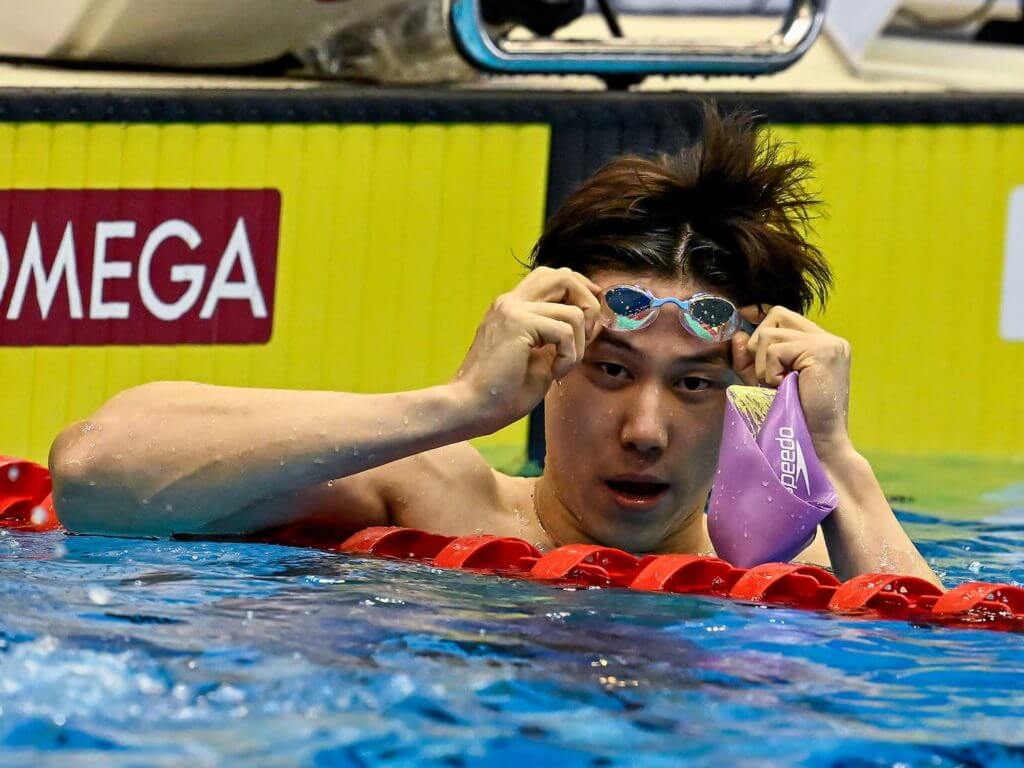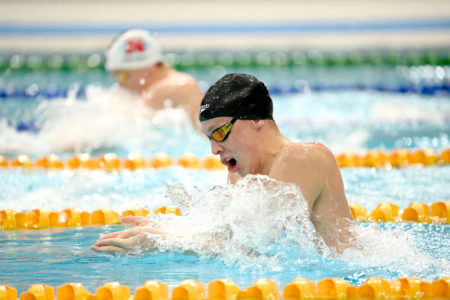Chinese Doping Controversy Hovering Over Paris Games

Chinese Doping Controversy Hovering Over Paris Games
Over the past three months, a significant doping controversy has dominated headlines thanks to recent revelations that 23 Chinese swimmers tested positive for trimetazidine (TMZ) months before the Tokyo Olympics but received no sanction. As athletes have arrived in Paris for the start of the Olympic swimming competition, the issue remains prevalent as several of 23 are among China’s main medal contenders.
Zhang Yufei, a gold medalist three years ago in the 200 butterfly and 800 freestyle relay, is again a key contender in both butterfly events, while Wang Shun will try to defend his gold medal in the 200 IM. Another of the 23 swimmers, breaststroker Qin Haiyang, was the world champion last year in all three breaststroke events.
After German broadcaster ARD, The Daily Telegraph and the New York Times first reported the news in April, Chinese anti-doping authorities attributed the test results to food contamination from a hotel where all 23 swimmers had been staying. The World Anti-Doping Agency (WADA) accepted the explanation without a full investigation or finding the source of contamination, frustrating anti-doping advocates.
The swimmers were never provisionally suspended, which would have been the normal procedure in such cases, where athletes would have been given the burden of providing their innocence. WADA appointed an independent prosecutor to review its handling of the case, and the prosecutor, whose independence has been questioned considering he was appointed by WADA, recently cleared the organization of wrongdoing in how it handled the case.
The Chinese swimmers who tested positive have made no public comments, but their potential rivals have concerns, their confidence in the anti-doping system shaken with the feeling that they deserved better three years ago and perhaps in Paris, too.
Australia’s Zac Stubblety-Cook, the defending Olympic gold medalist in the 200 breast, lost his world record in the event to Qin at last year’s World Championships. As he spoke at Swimming Australia’s pre-Olympic press conference Thursday morning in Paris, discouragement echoed through his voice.

Zac Stubblety-Cook — Photo Courtesy: Delly Carr (Swimming NSW)
“I absolutely believe in clean sport, and I hope that this is a clean Games,” Stubblety-Cook said. “It’s obviously disappointed to hear that news and hear about the pre-Tokyo 23 athletes testing positive, some multiple times. For me, racing someone and finding out he was one of those athletes was disappointing. I think it’s less about what country they came from and more about the system and how the system, it feels like ultimately it’s failed.
“Ultimately, I can have all the opinions, but I am now focused on what I can control, going into these Games and being a clean athlete and hoping my competitors will do the same.”
Stubblety-Cook and Qin are considered two of the favorites in the 200 breast in Paris. International Olympic Committee (IOC) Rule 50 bans any sort of political protest during competitions and medal ceremonies, but Stubblety-Cook refused to rule out taking action if conditions presented themselves. “Everyone is aware of Rule 50 and what would happen with that,” Stubblety-Cook said. “Personally, I would probably make a decision on the day.”
In the immediate leadup to the Olympics, World Aquatics has increased testing on Chinese athletes to abate concerns over the integrity of competition, but some question whether it is too little, too late. Katie Ledecky, a member of the U.S. women’s 800 free relay team that won silver behind China in Tokyo, pointed out that use of banned substances during heavy training periods long before competition is also a concern. Such swimmers could train harder and longer with less recovery time.
“I hope everyone here is going to be competing clean this week, but what really matters also is were they training clean?” Ledecky said Wednesday. “Hopefully, that’s been the case. Hopefully, there’s been even testing around the world. I think everyone’s heard what the athletes think. They want transparency. They want further answers to the questions that still remain.”
These concerns echo statements made by big-name athletes in recent months. British swimmer James Guy called for teammate Duncan Scott to be awarded 200 IM gold after he initially received silver behind Wang in Tokyo. American swimmers have expressed their frustration that their actions receive strict scrutiny from the U.S. Anti-Doping Agency (USADA), while their competitors from other countries are not subject to the same degree of testing.
“It’s extremely frustrating for the athletes to always have in the back of our mind that maybe this sport’s not fair,” Lilly King said at the U.S. Olympic Trials in June. “You know, when we put everything on the line, our privacy, really, everything that we do to compete with a level playing field, it’s extremely frustrating to not have faith that others are doing the same thing.”
Shortly after, 23-time Olympic gold medalist Michael Phelps, 10-time Olympic medalist Allison Schmitt and USADA CEO Travis T. Tygart appeared before a U.S. Congressional committee investigating WADA, with the former swimmers each noting the erosion of trust in drug testing worldwide. Schmitt, a member of the U.S. women’s 800 free relay in Tokyo that earned silver behind China, said that “after learning that the Chinese relay consisted of athletes who had not served a suspension, I look back with doubt.”
Prior to the start of competition in Paris, the controversy has bled outside of swimming and into wider Olympic politics. When the IOC was on the verge of awarding the 2034 Winter Olympics to Salt Lake City, it forced the U.S. Olympic and Paralympic Committee (USOPC) to fully respect “the supreme authority of the World Anti-Doping Agency in the fight against doping,” according to USA TODAY Sports, threatening to strip the city of hosting duties otherwise.
Nine days of swimming competition begin Saturday, with 11 of the 23 Chinese swimmers competing on the biggest stage yet again, and several of them are considered virtual locks to reach the podium. The memories of these positive tests will linger, sure to color the world’s reaction to any swimming final in which these competitors factor into the outcome.
Read more:
- American Swimmers Told of Chinese Doping Violations at Tokyo Olympics
- 23 Chinese Swimmers Cleared To Compete At Tokyo Olympics Where Some Won Gold Despite Positive Drug Tests: Reports
- WADA Releases Statement on Chinese Doping Positives; Threatens Legal Action
- Column: Lack of Transparency in Chinese Doping Tests a Glaring Failure of Anti-Doping Authorities
- ‘What happened to strict liability?’ Adam Peaty Hits Back at WADA over Chinese Doping
- WADA Appoints Independent Prosecutor to Review Handling of China Doping
- Katie Ledecky on Anti-Doping System: Faith at ‘All-Time Low’ (Video)
- Qin Haiyang, Wang Shun, Yang Junxuan Tested Positive for Clenbuterol Prior to 2021 Positives
- ‘Extremely Frustrating’ and ‘Disappointing:’ Lilly King, Other Americans Share Displeasure at Chinese Doping Controversies (VIDEO)
- Michael Phelps, Allison Schmitt Testify Before Congressional Subcommittee on Anti-Doping Measures, WADA
- WADA-Appointed Independent Prosecutor Exonerates WADA in Chinese Doping Case

- EVENT PAGE
- SCHEDULE
- VENUE
- STREAMING INFO
- DAY 1 PRELIMS RESULTS
- DAY 1 FINALS RESULTS
- DAY 2 PRELIMS RESULTS
- DAY 2 FINALS RESULTS
- DAY 3 PRELIMS RESULTS
- DAY 3 FINALS RESULTS
- DAY 4 PRELIMS RESULTS
- DAY 4 FINALS RESULTS
- DAY 5 PRELIMS RESULTS
- DAY 5 FINALS RESULTS
- DAY 6 PRELIMS RESULTS
- DAY 6 FINALS RESULTS
- DAY 7 PRELIMS RESULTS
- DAY 7 FINALS RESULTS
- DAY 8 PRELIMS RESULTS
- DAY 8 FINALS RESULTS
- DAY 9 FINALS RESULTS




Too late too little??! A few days ago the data have been released and since 1 January 2024 the Chinese swimmers have had an average of 21 tests vs the 4-6 tests of athletes in the other big Countries (Usa, Australia..). I think that this news should be given .